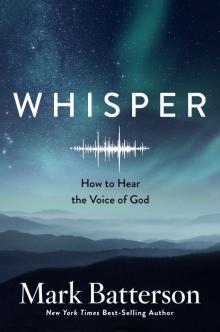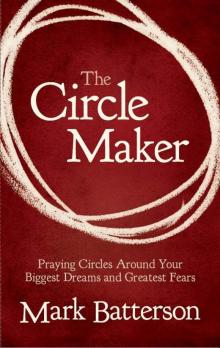- Home
- Mark Batterson
Whisper Page 5
Whisper Read online
Page 5
When Jesus declared, “Whoever has ears, let them hear,” the Jewish ear would have heard hints of Psalm 40:6: “My ears you have opened.” The Hebrew word for “opened” is archaeological, meaning “to excavate” or “dig through dense material.” I believe the way we do that is by listening with our inner ears. But the word for “opened” can also be translated “to pierce,” which has led many Bible scholars to believe that David was tipping his hat to an ancient ritual outlined at Mount Sinai.
After serving a six-year term, a Hebrew servant was set free in the seventh year.28 However, if a servant loved his master so much that he did not want to opt out of his servanthood, he was given the option of pledging allegiance to his master for a lifetime. How? By a sacred ritual that involved a pierced ear: “He shall take him to the door or the doorpost and pierce his ear with an awl. Then he will be his servant for life.”29
Has your spiritual ear been pierced?
Is your inner ear consecrated to Christ?
Is the still small voice the loudest voice in your life?
The Latin word for obey is obedire, which means to “give ear.”30 Obedience starts with a pierced ear. It’s tuning in to God’s frequency and turning up the volume. It’s obeying His whispers, even if a thousand people are screaming something different.
“Tell me to what you pay attention,” said the Spanish philosopher José Ortega y Gasset, “and I will tell you who are you.”31 You will eventually be shaped in the image of the loudest voice in your life—the voice you listen to most.
Genuine listening is ultimately an act of submission. If you’re married and you’ve had a “lively discussion” with your spouse, you know of what I speak. The natural reaction is to raise your voice, isn’t it? But that rarely solves the problem. Actually, it never does. The solution is shutting your mouth and opening your ears. The way we submit to one another is by genuinely, thoughtfully, patiently, and carefully listening. And a relationship with God is no different.
The Inner Ear
It’s hard for us to imagine that the solution to our problems is listening, but listening is the litmus test. To fully appreciate its importance, a little ear anatomy is necessary.
Sound waves crash into our ears like ocean waves on a beach. They travel through a labyrinth that author Diane Ackerman likens to a “maniacal miniature golf course” complete with “curlicues, branches, roundabouts, relays, levers, hydraulics, and feedback loops.”32
The outer ear functions like a funnel, catching the sound. After traveling through the ear canal and hitting the eardrum, the vibrations bump into three of the tiniest bones in the body: the hammer, anvil, and stirrup. From the middle ear, the vibrations spiral through a snail-shaped tube called the cochlea, which contains thousands of microscopic hair cells that amplify the sound along its way. From there the eighth cranial nerve transmits impulses like Morse code to the auditory cortex, where pitch, volume, tone, distance, direction, and meaning are translated into actionable information.
Again, don’t tell me you’ve never experienced a miracle. You experience one every time sound makes its mysterious journey through your outer, middle, and inner ear.
One of the mysterious capabilities of the human ear is tuning out certain sounds while tuning in others. When I played basketball in college, no matter how many people were yelling and screaming, I could discern my dad’s voice above the crowd. This capability “is possible,” notes Ackerman, “because we actually hear things twice.”33
Audiologically, there is a short time delay between sound waves hitting the outer ear and reaching the inner ear. So some things we listen to once, others twice. When Jesus said, “Whoever has ears, let them hear,” I think it’s an exhortation to listen not once but twice. It’s in that gap between the first hearing and second hearing where we discern the promptings of the Holy Spirit.
Don’t just listen to God with the outer ear. That’s how things go in one ear and out the other. Give God a second hearing, with the inner ear. That’s how truth gets from your head to your heart of hearts. And maybe, just maybe, that’s how to get from the outer courts into the inner courts—the Holy Place, where God manifests His presence!
Inverse-Square Law
The whispering spot in the United States Capitol may be the most famous whispering gallery, but it’s not the only one. The whisper effect was first discovered in 1878 at Saint Paul’s Cathedral in London by Lord Rayleigh. Rayleigh won the 1904 Nobel Prize for his discovery of the element argon, atomic number 18. But his true passion, his lifelong fascination, was sound. In fact, Lord Rayleigh has a low-frequency sound wave named after him. The Rayleigh wave is inaudible to the human ear, but it’s the frequency that birds, insects, and other animals use to communicate infrasonically.
Lord Rayleigh, a devout Anglican, explained the mystery of traveling whispers in Saint Paul’s Cathedral through brilliantly designed sound experiments showing that one whisper produced four, five, even six echoes. According to the inverse-square law, sound should decay in intensity as an inverse of distance.34 As sound travels, it disperses, so hypothetically our words should have half the energy at twice the distance. Whispering spots are a unique exception to this rule. Whispers in Saint Paul’s can be heard loud and clear long distances away because of the curvature of the ceilings and walls.
You can guess where this is going, can’t you?
Just as there are whispering spots in the physical realm, there are whispering spots in the spiritual realm. And I want to help you discover your whispering spot—the place you go to hear God’s whisper, the place where His voice echoes loudest and longest, the place where He speaks via healing and revealing, convicting and creating.
God’s voice is not subject to the inverse-square law or any other law of nature for that matter. His voice does not diminish over space and time. The God who defined the laws of physics in the first place has the power to defy said laws. The God who created the sun can make the sun stand still. The great irony, of course, is that when He breaks the laws of physics, we call it a miracle. And it is. But it’s really the second miracle in a sequence. Making the sun stand still is miraculous, but so is keeping Earth in orbit. Celebrate the second miracle, but don’t discount the first one. It’s a double miracle.
All of that is to say this: the sound of God’s voice does not decay with distance.
The prophet Isaiah said it this way:
So is my word that goes out from my mouth:
It will not return to me empty,
but will accomplish what I desire
and achieve the purpose for which I sent it.35
Remember, God’s first four words are still echoing at the outer edges of the universe, creating galaxies everywhere they go! What’s true of those first four words is true of every whisper. As I inventory my life, I realize that all the blessings, all the breakthroughs, are really echoes of God’s whispers. I’ve also learned there are certain places and postures that help me hear the voice of God more clearly.
The Tent of Meeting
When I was in college, one verse affected me more than any other. It might seem a little strange at first, but it inspired my first whispering spot. It’s the story about the tent of meeting that Moses pitched outside the camp of Israel while the Israelites wandered the wilderness. My take on it is that Moses pitched it outside the camp so he’d be out of earshot. He was tired of the Israelites’ incessant grumbling, complaining, and murmuring, and he desperately needed a quiet place—a whispering spot.
Moses is the lead actor in this story, but there is an extra scene at the very end.
Then Moses would return to the camp, but his young aide Joshua son of Nun did not leave the tent.36
Have you ever wondered why God chose Joshua to succeed Moses? For starters, he was one of the two spies who brought back a positive report when the Israelites first explored Canaan.37 The other ten spies
, who had very loud voices, brought back negative reports. The people listened to the wrong voices, and it cost them forty years!
But there is a second reason God chose Joshua to succeed Moses. God trusts most those who know Him best, and those who know Him best are those who have spent the most time with Him. Since Joshua never left the tent of meeting, he was the obvious choice.
When I was in college, I wanted to be Joshua. Every time there was an altar call, I responded. Why? Because I didn’t want to leave whatever gift God wanted to give me at the altar. That’s an opportunity cost I didn’t want to pay. I also created a “tent of meeting” that turned into my first whispering spot.
Nearly every day after lunch I would sneak into the chapel. The lights were off, and the chapel was empty except for an occasional janitor sighting. I’d climb the stairs to the balcony, where I’d pace and pray. We didn’t have Fitbits back then, but I bet I walked a hundred miles as I prayed my senior year. That’s where I learned to discern the voice of God, including a check in my spirit that kept me out of what could have been a bad situation (which I’ll detail when I talk about the language of doors).
In seminary my whispering spot was the four-hundred-square-foot apartment my wife and I rented on the campus of Trinity International University in Deerfield, Illinois. Lora worked while I took classes, so I had the apartment to myself most days. It was there that God picked me up and dusted me off after our failed church plant.
One of my longest-standing whispering spots was a marble pillar in front of Union Station in Washington, DC, where National Community Church met for thirteen years. I would perch myself on that pillar on Saturday nights, talking and listening to God.
My current whispering spot, and my all-time favorite, is the rooftop of Ebenezers Coffeehouse. I get great reception up there! When you pray on top of a miracle that God has already done, it’s hard not to have faith. That coffeehouse was once a whisper, and God continues to whisper to me there.
When I first started praying in the chapel balcony or on the rooftop of Ebenezers, they were just “spots.” Over time they turned into whispering spots. Whispering spots don’t have to be exotic. Quite the contrary. They’re often as ordinary as a closet that turns into a prayer closet. The key isn’t geography; it’s consistency.
If you show up, God will too!
Listening Point
In 1956 environmentalist Sigurd Olson built a small cabin on the banks of Burntside Lake in northern Minnesota. The naming of lake homes is customary, especially in the land of ten thousand lakes. Most names are rather predictable, but Olson was a little more intentional. His objective in building the cabin was to “hear all that was worth listening for,”38 so he named it Listening Point.
Listening doesn’t happen by default; it happens by design. You have to go outside the camp and build a tent of meeting. You have to seek solitude, seek silence. You have to ruthlessly eliminate distractions. And you have to turn some voices down or tune them out altogether. It might be as innocent as talk radio or as innocuous as social media. Why not turn off the radio and talk to God during your commute? Or fast from social media for a season? Or take a silent retreat?
I don’t want to overspiritualize the importance of a whispering spot, but I don’t want to underspiritualize it either. Even if you take spirituality out of the equation, you need a space or place to get some peace and quiet. If you live in a city, as I do, it’s not easy. And if you’re a parent of little children, it might be ten minutes during nap time. No matter, you have to be bound and determined to find a time and a place.
Susanna Wesley raised seventeen children in a very small home, so solitude was hard to come by. Her whispering spot was a rocking chair in the middle of the room. When she threw a blanket over herself, it turned into her tent of meeting.39
Perhaps that’s what inspired her son John to kneel next to his bed.
Thomas Edison had a “thinking chair.”40
Alexander Graham Bell had a “dreaming place” overlooking the Grand River.41
Henry David Thoreau skipped stones on Walden Pond.
Then there was Ludwig van Beethoven, who began his day at dawn with a cup of coffee that he prepared with great care by counting sixty beans per cup.42 He sat at his desk until early afternoon and then took a stroll to reinvigorate his mind. He carried a pencil and a few sheets of music paper in his pocket to record chance musical thoughts.43
Your whispering spot will be as unique as you are, but you need to find a time, find a place.
May I ask a seemingly silly question? Have you ever tried setting up a meeting with someone without designating a time and place? Imagine asking someone when he wants to meet, and he says, “Whenever.” Or asking him where he wants to meet, and he says, “Wherever.” Good luck with that meeting! I appreciate flexibility, but that meeting is never going to happen except by accident.
A Defining Decision
Solitude is one key to hearing the voice of God, no question, but it needs a counterbalance. Hearing the voice of God is not a solo sport; it’s a team sport. And one of the best ways to hear His voice is to get around those people who do. Is there someone in your life who seems to hear God more frequently, more clearly, than you do? Get as close to that person as you can. You just might hear, or overhear, the voice of God!
Dick Eastman is one of those people for me. I’ll never forget the day he and I sat in my office and he shared about a defining moment in his life.44 Someone had given him a cassette-tape recording of “The Holy Hour!” by Archbishop Fulton J. Sheen speaking to a group of nuns. The recording quality was so poor that Dick could barely hear what was on it, but he heard the voice of God loud and clear. That cassette tape changed the course of his life because of a defining decision he made after listening to it.
The eighty-year-old archbishop revealed to the nuns the secret of his success as perhaps the most influential Catholic in America at the time other than the pope. It could come across as a little condescending out of context, but the older you get, the more blunt you can be. There’s no time to dillydally. Sheen said, “You nuns are far more intelligent than me. So why am I speaking to you?…I’ll tell you why.” Then the archbishop answered his own question: “Because my words have power.” And why did he believe his words had power? “My words have power because for fifty-five years, 365 days a year, I’ve spent an hour in God’s presence.”
As Dick listened to that crackly cassette tape, he came under intense conviction. When he shared this story with me, it was more than forty years after the fact, yet there were tears in his eyes. He said, “Mark, I couldn’t say that for seven days!” Something snapped in Dick’s spirit that day. He made a defining decision to spend an hour a day, every day, in the presence of God. Dick has now practiced this daily ritual for nearly as long as the archbishop had.
For most of his ministry, Dick Eastman has served as international president of Every Home for Christ, an organization that has led an estimated 191,000,000 people to a faith decision and started more than 324,000 church fellowships called Christ Groups. Is it any wonder why? Is it any secret how? And God wants to do it again through you.
Finding a whispering spot takes time and patience.
Finding a whispering spot takes effort and intentionality.
That said, we aren’t always the ones who decide when or where or how it happens. Sometimes we find whispering spots, but sometimes whispering spots find us.
Sometimes this happens because of a crisis that drives us to our knees, such as Paul and Silas getting thrown into prison.45 In my experience tough spots often turn into whispering spots. I’ve heard God in some pretty exotic places, including the Grand Canyon and the Andes Mountains, but not as clearly as I heard Him after regaining consciousness in the intensive-care unit at Washington Hospital Center after two days on a respirator. That hospital room was a whispering spot in the wee hours of the morning.
A Defining Moment
A few years after making the decision to give God an hour a day, Dick Eastman felt led to spend an entire day doing nothing but worshipping Him. He wasn’t entirely sure how to do it, but he decided to give it a go during a trip to Washington, DC, because he had a day with no commitments on his calendar.
Dick started worshipping God in his hotel room right when he woke up. He continued worshipping while he checked out and ate breakfast. Then he decided to find a park outside the Beltway where he could take a long walk through the woods and worship without distraction. Dick eventually came to a clearing in a grove of trees, and he felt as if he wanted to worship God in a way that he never had before. He had read about David dancing before the Lord, but he admitted, “Mark, I grew up in a church where you don’t dance! I didn’t know how to dance, I didn’t know what to do, but I just felt like I should try.”
After double-checking to make sure no one was watching, Dick started dancing in the middle of that clearing. His dancing was so bad that Dick actually started laughing out loud at himself. When he was done, he wondered how that could possibly have been pleasing to the Lord. Dick very meekly said, “Lord, was that okay?” The Lord whispered back, You have no idea how much joy you just brought Me!
I live by an Oswald Chambers’s maxim: “Let God be as original with other people as He is with you.”47 So I’m not suggesting that you find the nearest clearing in a grove of trees and dance before the Lord. In fact, our family was out at a restaurant the night I had shared that story in a sermon, and for whatever reason I busted out a dance move. My youngest son, Josiah, was spot on: “Dad, this isn’t a clearing in a grove of trees!”

 Jack Staples and the Ring of Time
Jack Staples and the Ring of Time Jack Staples and the City of Shadows
Jack Staples and the City of Shadows Jack Staples and the Poet's Storm
Jack Staples and the Poet's Storm Whisper
Whisper The Circle Maker_Praying Circles Around Your Biggest Dreams and Greatest Fears
The Circle Maker_Praying Circles Around Your Biggest Dreams and Greatest Fears